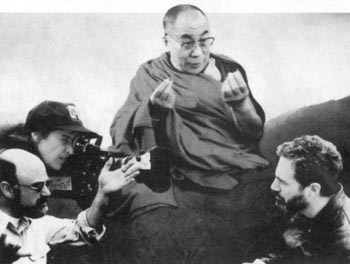Flower Power
Holy man: Writer Rodger Kamenetz meets the Dalai Lama in The Jew in the Lotus.
Spiritual discovery blossoms in 'The Jew in the Lotus'
By Patrick Sullivan
AS SPIRITUAL odysseys go, this one's hard to beat: An emotionally troubled man searching for answers to some of life's most difficult questions gets a strange invitation from an old friend. He soon finds himself tagging along with a group of Jewish rabbis and scholars traveling to India for a historic meeting with the Dalai Lama, the spiritual leader of the Tibetan people.
The trip has profound personal consequences: It forces him to confront his own indifferently observed Judaism, it tears open scabs covering half-healed emotional wounds, and it ends up changing him forever.
It also gives one hell of a boost to his career as a writer. Rodger Kamenetz's 1994 book about his experiences in India was a best-seller that struck a deep chord in many Jews, Buddhists, and various unaffiliated seekers of spiritual solace.
Now, director and producer Laurel Chiten has attempted to bring this richly complicated true story to the big screen in the form of a one-hour documentary film, which plays at the Sonoma Film Institute on Friday and Saturday, Nov. 6 and 7.
To make The Jew in the Lotus, Chiten combined video footage from the historic trip with interviews done later with the participants. Thrown into the mix are a voice-over narration by Kamenetz, a little stop-motion animation, and some historical footage of pre-Chinese Tibet. There's nothing terribly unusual about this formula. In fact, some may wish that the filmmaker had adopted a more daring approach to match her offbeat subject. But perhaps the film's straightforward method is the best way to tell this unusual story without bogging down in its disparate themes.
Plagued by self-doubts and the chattering neurotic voices in his head, haunted by the recent death of his child and the failure of his book, Kamenetz stumbles into his life-changing trip almost by accident.
"Why was I there?" he asks. "I don't know."
But the accidental tourist hops on the plane anyway, joining a distinguished group of eight Jewish leaders representing different strands of the faith, all bound for the subcontinent.
They are going for a meeting of minds with the Dalai Lama, in response to his plaintive request: "Tell me your secret," come the words from the famous bespectacled face, "the secret of spiritual survival in exile."
The parallels between the experience of the Jewish people and the plight of the Tibetans are many and obvious. With the Chinese invasion of the 1950s, Tibetan society was suddenly stripped of the Buddhist theocracy that long served as its fundamental organizing principle. Many Tibetans were killed; others (including the Dalai Lama) were driven into exile. Conquest and the diaspora have not been kind to Tibetan culture: The language and religion are practiced by a diminishing number of people, and hope for freedom seems to be fading. Small wonder, then, that the Dalai Lama would seek advice from a culture that has maintained its unique customs in the face of intense persecution for thousands of years.
ONE OF THE BEST (and most bizarre) things about The Jew in the Lotus is the curious contrast between this profoundly important mission, with its weighty social and spiritual implications, and the neurotic self-obsession of the narrator. Every time the film returns to Kamenetz, it seems that he's discussing himself, even when it's just to explain how pathetic he is compared to his learned companions.
"I was in a delicate state of mind to be flying halfway around the world: a writer certain he couldn't write," Kamenetz explains as he sets off. His wife readily admits to the camera that she found her emotionally tortured husband's departure a profound relief, "like a weight was lifted from me." That's a sentiment the viewer may occasionally feel a bit too much sympathy with, but that fades in time. There's something oddly appealing about Kamenetz's naked narcissism, this intense focus on his personal emotional crisis. And quietly, subtly, the film unites the personal story with the ecumenical exchange.
Alongside all the big issues, the film offers a number of incidental visual gems. In one highlight, the camera explores New Delhi and captures the sights and sounds of a city trapped between tradition and modernity. Lovely children walk with huge eyes through dirty city streets, a man with no hands gestures in frantic explanation, a water buffalo placidly occupies the center of a busy street as traffic moves with careful speed around him.
But perhaps it's wrong to call these shots incidental. Visual talent is surely the director's gracious gift to this quirky story. Her careful composition and grace with the camera distract us from several flaws. (We wait in vain, for instance, for the Dalai Lama to say more than a few sentences.) In the end, her documentary proves a short but satisfying walk through Kamenetz's blooming spiritual garden.
[ Sonoma County | MetroActive Central | Archives ]
Copyright © Metro Publishing Inc. Maintained by Boulevards New Media.
![]()

Michael Amsler
The Jew in the Lotus plays at 7 p.m., followed by Twitch and Shout at 8:15, on Friday and Saturday, Nov. 6-7, at the Sonoma Film Institute in Sonoma State University's Darwin Theater, 1801 E. Cotati Ave., Rohnert Park. Admission is $5, $4 for seniors, $3 for SFI members and kids. 664-2606.
From the November 5-11, 1998 issue of the Sonoma County Independent.
![[MetroActive Movies]](/gifs/movies468.gif)